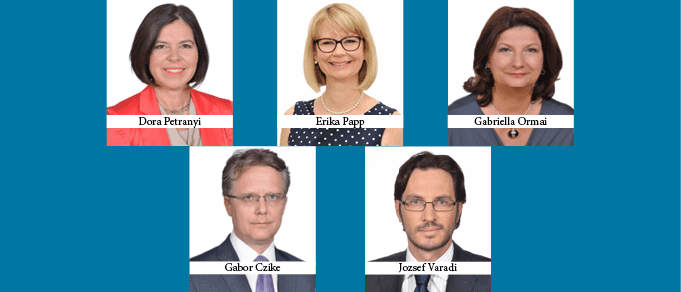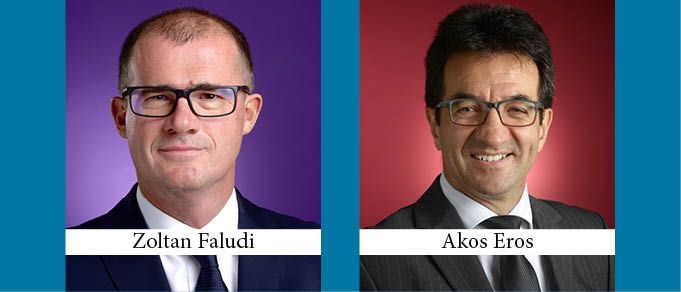In January 2019 CEE Legal Matters reported that Deloitte Legal had advised K&H Bank on long-term non-recourse project financing provided to Photon Energy Group for Photon Energy’s 11.5 MWp proprietary PV power plant portfolio in Hungary. Pontes Budapest advised Photon Energy on the deal. We reached out to both firms for more information.
E-Mobility: Opportunity or Inconvenience for the Commercial Operators of Parking Places?
The number of electric vehicles in Hungary is rising. In response to this, the National Building Regulation of Hungary (OTEK) has established new requirements for the provision of recharging points, with a January 1, 2019 deadline. Although these new rules have had some visible results, there is significant delay in establishing full compliance. Those who fail to meet the requirement may anticipate the imposition of penalties.
Recent Developments Regarding Hungarian Insolvency Law
The Hungarian Government is considering creating new legislation to cover all kinds of insolvency proceedings, including bankruptcy, liquidation, winding-up, and dissolution proceedings. This move has been roundly welcomed, especially by creditors, as the current law is from 1991, and although it has been amended numerous times, it counts as an outdated and much-criticized piece of legislation.
Pearls On The Danube: CMS Celebrates 30 Years in Budapest
In honor of CMS Budapest’s 30-year anniversary – the Pearl anniversary, formally, in the city often called the Pearl of the Danube – we reached out to several of the prominent partners to learn a bit more about the changes they’ve seen over the years, and the practices they manage.
Guest Editorial: Winners Hunt in Packs
As a first-generation lawyer I did not have a profound career perspective when I graduated from law school in the early ‘90s. I saw a job ad in a newspaper – “International law firm looks for junior lawyers” – and even though I had no clue what an “international law firm” was, I had nothing to lose, so I thought it would be worth seeing how a real job interview worked. In the end I was selected and I decided to stay … and I have never regretted that decision.
Current Challenges for the Automotive Industry in Transition
The automotive industry is facing several changes that will shape the future of mobility and production. The car of the future will be electric, connected, and automated, and it will provide benefits for individual consumers and society as a whole. One major message of the recent Automotive in Transition Conference in Budapest was that the automation revolution is bringing challenges, but it is also bringing new opportunities for Hungary to emerge stronger from the transition process.
The Corner Office: Commonly-Lacking Skills
In The Corner Office we ask Senior and Managing Partners across Central and Eastern Europe about their unique roles and responsibilities. The question this time around: “What is the one skill, ability, or characteristic that fresh law school graduates in your country most commonly lack?”
Power Generation Trends in Hungary: Solar Sail
In recent years, a principal aim of Hungary’s energy strategy has been to make the country self-sufficient in electric energy. In figures, this means reducing the import to 0% within ten years – as the country’s current dependency on import of approximately 30% is significantly above the EU average. The increasing price of gas and the decreasing price of electricity led to a decrease in the domestic production of natural gas, so the Hungarian energy policy had to turn to alternatives.
Recent Changes in Corporate Income Taxation in Hungary
The 2019 Hungarian tax law changes, among other measures, have introduced a new group taxation regime and reflect the implementation of the provisions set out in the European Union’s Anti-Tax Avoidance Directive (ATAD).
The Promise of Predictability in Litigation
The new Hungarian Code of Civil Procedure (the “Code”) came with a number of ambitious promises, many of which have already been addressed in CEE Legal Matters. However, a prominent promise, namely increasing the transparency and predictability of litigation, has not yet been discussed in these pages.
Bajtars: Comrades and Colleagues at Wolf Theiss Hungary
On September 11, 2018, CEE Legal Matters reported that Akos Eros, the Managing Partner of Squire Patton Boggs in Hungary, had taken a team from that international firm to join Wolf Theiss, led in Budapest by his old friend Zoltan Faludi. The reunion of these two actual comrades-in-arms is a source of real excitement at Wolf Theiss Hungary, which is embracing the changing legal market of the moment with confidence and style.
Draft Communication on Commitments in Competition Cases
The Hungarian Competition Authority has launched the public consultation process about the draft of its updated and amended communication concerning commitment decisions in Hungarian competition cases.
Marketing Law Firm Marketing: The Biggest Difference
The news that many of the legal markets in CEE impose stricter rules on law firm advertising and marketing than many of their Western counterparts comes as no surprise. Still, to explore this concept just a bit, for this issue, we asked law firm marketing and BD experts around CEE: “What, in your opinion, is the biggest difference between law firm marketing in your market and law firm marketing in London or New York?
The Hungarian National Bank Seeks to Cool Down Over-Heated Real Estate Market
Guidance No. 12/2018 (II.27) of the Hungarian National Bank entered into effect on July 1, 2018 (the “Guidance”). Although the Guidance is non-binding, financial institutions are expected to comply with its provisions. In this article, we provide a list of the most important points of the Guidance and predict market reactions based on our ongoing mandates and information obtained from our clients.
Acting In Alliance: A Look at act legal’s Growing Footprint in and Beyond CEE
On March 9, 2018, CEE Legal Matters reported on the expansion of the European act legal alliance with the addition of Hungary’s Ban Karika law firm and Fort Advocaten from the Netherlands. With the alliance now counting 13 offices in Europe – including five in CEE – CEE Legal Matters sat down with Sven Tischendorf of act legal Germany, AC Tischendorf Rechtsanwälte to learn more about the alliance’s plans.
The Corner Office: Mentors
In The Corner Office we ask Managing Partners across Central and Eastern Europe about their unique roles and responsibilities. The question this time around: Who was your mentor, and what was the most important lesson you learned from him or her?
Expat on the Market: Interview with Christopher Noblet of Hogan Lovells
English lawyer Christopher Noblet has been based on Hogan Lovells' associated Budapest office since 2000 and leads its transactional and real estate team in Hungary. He studied law at King's Kollege London.
Facing the Public After the GDPR: How to Draft Privacy Notices
Based on the transparency requirements of the GDPR, companies must now provide more detailed information on data processing. The usual form of relaying this information to the public is through a privacy notice. Now that May 25, 2018 is fast approaching and companies are working towards GDPR compliance, such privacy notices must be finalized.




















